#lead female queer characters
Explore tagged Tumblr posts
Text
"I am Evelyn Hugo": Exploring Possession, Fame, and Freedom in "The Seven Husbands of Evelyn Hugo"
Lights, camera, action! Tonight, we're uncovering the painful secrets underneath the glitz and glamour of Hollywood with "The Seven Husbands of Evelyn Hugo".
Content Warning: The Seven Husbands of Evelyn Hugo contains open discussions of biphobia and homophobia, as well as sexual and domestic violence, misogyny, alcoholism, chronic illness, discussions of suicide, abortion, and traumatizing familial revelations. Reader discretion is advised. If you’re under the age of 18, stay in a child’s place. There’s nothing for you here. Spoilers for The…
#BIPOC female lead#BIPOC lead#erasure#famous characters#fictional memoirs#fictional tellalls#Hollywood#hollywood studio era#lgbt+#Old Hollywood#passing#queer romance#romance#sapphic drama#sapphic romance#scandal#taylor jenkins reid#the seven husbands of evelyn hugo#white passing
122 notes
·
View notes
Text
What if your favorite video game series became a major discussion point in queer game studies, and oh no everyone got it entirely wrong
#focus on the MC marriage options as like the point and meaning of queerness is just so off and wrong it's the totally wrong approach#it treats the most blah form of liberal inclusion possible as the focal point of analysis#and Everyone writes “Sure there are lesbians but I'm not going to pay attention to that what really matters is the dearth of gay men”#while ignroing the actual text of the game! like the reason why is because the queerness of the game is connected to the female character#while the male leads hold to a more traditional view of the family god YOU WOULD KNOW THIS IF YOU PLAYED THE GAME#instaad of writing an essay based entirely off the video of the marriage proposal#also queer inclusion being defined by marriage proposals is#again!#heteronormativity! not the ideal! not what we're suppose to be doing here!
9 notes
·
View notes
Text
*grump grump*
It’s a novel about discovering you’re queer in your twenties what the fuck are y’all talking about.
#was trying to remember the name of A Fistful of Sky’s….. antagonist? second protagonist? secondaryish romantic lead? (it’s Altria)#except my copy is….. somewhere so I couldn’t just grab it#and like all the reviews are both a. trash and b. Missing The Point#like if I had to point at a novel that defined my teenage relationship with being queer this is like top two#(the other is A Stir of Bones which are less blatantly queer than it’s…. later chronological books but for thematically correct reasons)#anyway the two major complaints are ‘this doesn’t wrap up with the family resolving their issues’#and ‘not mature enough for adult fantasy’#and it’s like (spoilers and/or death of the author) this is a novel about coming to terms with yourself for being queer#and coming to terms with coming to terms with your family about being queer may never be an option#and also about taking love where you find it and how it is not how you’d like it to be#(the main character is both explicitly bi by the end (…..sort of)#and in a relationship with a nonhuman shapeshifter who uses female pronouns and wears a woman’s body but doesn’t actually care about it#I’m going to fight all these middle aged moms like what the fuck#also fuck you too mature for ya I was thirteen and it was difinitive and I got way more out of it than my mom did too
2 notes
·
View notes
Text
#“maybe he's lonely” and then seasmoke finds a new partner at the same time rhaenyra finds a new partner in mysaria.... much to consider.
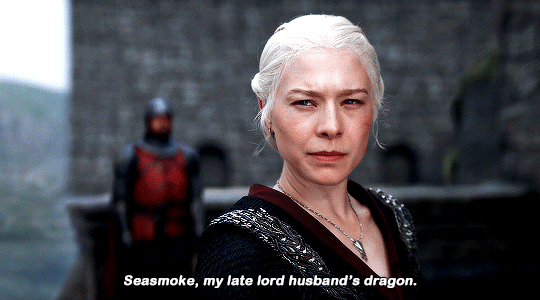

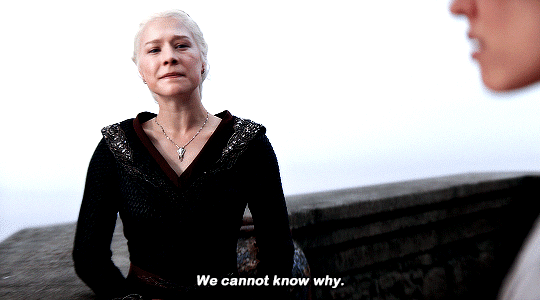
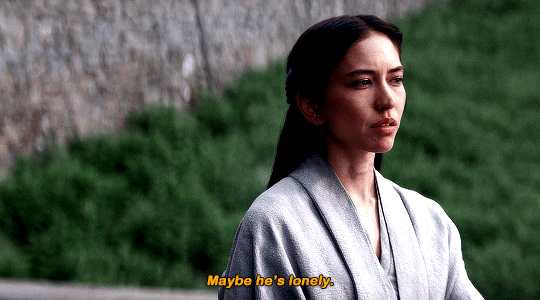

House of the Dragon | 2.03 "The Burning Mill" dir. Geeta Patel
#awwww#i also clued in that it was about rhaenyra at the time#i just couldn't have anticipated mysaria filling that void for her#certainly not in a gay way :p#very sweet#i'm very partial to sincerity so i was pleasantly surprised that it felt sincere - that it seemed intended as such#call me a square but i'd been dreading that it would be merely manipulative - i loathe how often that's the only angle of female queerness#we'll see how it develops - for now there's conflicting creative commentary about it#obviously on a tragic dramatic show like this it is always gonna be complex - just wondering what the narrative Function will be#going from a spur of the moment earnest welling up of desire and connection - enriching interiority for both characters#- to a lead writer saying it's cause to Complicate things and that it's 'gonna be a problem'... hm hm hm we'll see#house of the dragon
3K notes
·
View notes
Text
Miracle Day
Before I sealed the temple I had a ‘friend’ called Sierra. I remember her well. She was a high school junior at the time. She seemed like the popular type, always talking about this or that friend, and I counted myself lucky to be among them. We talked about lots of things, but my favorite times, perhaps, were those we spent in silence. I remember the days when the warm summer light and the sound of her scratching notes into her textbook lulled me into an afternoon nap and when I woke up, she was still there. That was the thing about Sierra. She seemed easygoing, almost shallow at times, but when she seemed most at ease was when you could sense that quiet determination from her. I counted myself extra lucky to know that side of her. Of course, eventually, I cast her out like all the rest. But as much as I wanted to hate her, she was still my big sister in my heart.
“Hey, check it out!” She said one day, holding a shiny black box “I finally got a phone for my birthday.”
I looked away from her.
“What’s up with you?”
“I want a birthday too.” I said, rolling on my back and staring into the ceiling. Sierra laughed.
“Everyone has a birthday, silly.”
“Yeah, but I don’t know what mine is.” I sulked.
There was the day my mother found me, of course. It was something she described as a “miracle” in the literal sense. She said the chances that I survived long enough for her to find me were in the trillions to one.
“So, you have a miracle day then?”
“What…?”
“Man… I wish I could have a miracle day.” Sierra whined dramatically. “My day is a special one out of three hundred sixty five days… but yours is special in three million million worlds. I’m jealous~”
~~~
“Happy miracle day~!” Iris sung as she barged in the room. I had been up for a few hours already, so the sight of her bed head and pajamas brought a small smirk to my face. Iris, of course, was enamored with the concept of my miracle day. She laughed about how it was yet another entry in the long list of things that made me special. She plopped down next to me and lodged her head in the space she had carved out for herself between my head and shoulders. My adjuncts had all made themselves scarce today. As much as Iris wanted, needed, was dying to throw a party for my miracle day she had completed the monumentous task of suppressing her baser extraverted instincts for my sake. We would have the day all to ourselves.
“Thanks.” I said feeling her soft locks bunched against my neck.
“For?”
“You know.”
“I want you to say it though~” Iris laughed. I knocked her on the head lightly.
“...for saving me.”
“I was going for the miracle day stuff actually, but that’ll do.”
I sighed. “I know.”
Iris rolled off of my shoulder and planted a kiss on my lips. “Besides, I’m sure you’ll want to take it all back after my birthday party! You have to come, you know.”
“Of course I’m coming. It’s the least I can do.”
Iris gave me another kiss before running off to get dressed for the day. I had let Iris plan everything out since she likes that kind of thing and I let my mind wander a bit. For the first time, on this miracle day, I had forbidden myself from scrying at all. I wondered if I should spend more time like this, alone with my thoughts instead of scrying to pass the time between Iris’s intrusions. Maybe if my mother had someone like Iris to ground her in reality she wouldn’t have lost herself in the Veil, mired in the worlds that weren’t. I guess in some ways, I could say I’m ‘using’ Iris to prevent that fate.
I smiled to myself.
My frivolous semantic doubts were strangely comforting, like normal anxieties a normal girl might have.
We went to the bakery first, but that wasn’t really the point per se because Iris decided to take a bunch of random detours to draw things out. My life being what it was, I didn’t really have “things” I liked other than spending time with her, so I would’ve had a hard time planning an actual itinerary too. I never really thought of myself as someone who enjoyed a nice long stroll, but it was clear that Iris thought I was.
And, yeah, I guess she’s right. I do like a long walk. Sometimes it feels like she knows me better than I do. That’s the nice thing about Iris.
Well.
One of them, at least.
At the bakery I got a blueberry muffin. Anna used to buy these every so often and I would use my ability to make sure I got the one with the highest blueberry content. Today though, it was up to chance. Iris doesn’t have a sweet tooth. She got a regular croissant with no filling or anything. I had honestly pegged Iris as the type of person who would predictably love desserts and such but she’s always finding new ways to surprise me. That was another nice thing about her.
We ate in silence. Iris rested her hand gently on my leg as we sat with our thoughts. It was hard not to remember Sierra on my miracle days. She was the one who ‘invented’ the concept after all. And I remembered how our infinite futures converged on that point when she stormed out because I refused to use my ability to help her with the IMAGE entrance exams. Of course, it didn’t happen that way in every future. Some were better, some were worse. Some were much worse. But in the end, there was nothing I could do about it. Normal people experience bad luck from time to time, but when dealing in infinity, I experienced it every time, even if it didn’t fully come to pass. Sealing the temple wasn’t just to keep out the people who wanted to use me. It was my way of sealing my own fate. If I stayed secluded I could reduce the the variance in the paths around me and eliminate those one in a hundred scenarios that I would be forced to reckon with every time I scried. I sighed. One such confounding variable seemed to have found her way into my miracle day. I took one last bite of my muffin before I met her gaze.
No blueberries.
Iris had probably told Delphi and the adjuncts to stay clear of this bakery, but Nell wasn’t an adjunct. In fact, we hadn’t heard from her at all since IMAGEs exams started almost two weeks ago. She stood awkwardly in front of us like she knew she was interrupting something but that it might be more awkward for her to pretend not to notice us. I glanced over to Iris assuming she would understand how I wanted to resolve the situation.
Which of course she did.
While Iris was occupying Nell with small talk, my thoughts began to wander again. Here was someone who had stated her intention to ‘use’ me from the outset. She came to me seeking possible leads on the talisman crisis at IMAGE and I reluctantly let her in on Iris’s recommendation. Even if I was a means to her investigation’s end, Nell was more often than not distracted by me and the temple. She wanted to know everything; even, or maybe especially, the things that had nothing to do with her mission. The moment Iris started explaining what my miracle day was, I saw her hand twitch towards her front pocket, where her notebook typically was.
“You can keep a mental note of that one.” I finally cut in. Nell had something of a habit of keeping notes on the things, people and places she found interesting. She claimed it was for her investigation, but it was easy to see her notepad had evolved into something closer to a diary at this point and it was amusing watching her get all flustered trying to explain that she wouldn’t take notes on someone mid conversation.
“It is funny, though. It feels like kind of a miracle that we even got to meet.” Nell mused after she had calmed down a bit. “Farsight temple’s been closed for as long as I can remember, but now I can count myself among the lucky few of Oracle’s friends.”
I could tell Nell kind of wanted to hang out with us a bit longer, which I wouldn’t have minded that much, but her anxieties got the better of her and she found an excuse to leave us soon enough. Still, it was a miracle in a sense that Nell and I became… ‘friends.’ A miracle that Iris had met me on that day. A miracle that I took a chance on her. I might not have created that miracle, but I could have stopped it. I wonder how many countless miracles hadn’t occurred for one reason or another. That was my mother’s domain, of course, the very thing that eroded her soul beyond repair. A strange thought entered my head then, a fleeting sliver of possibility.
“Oracle?” Iris said, shocking me out of my musings. “You okay?” She gave my hand a light squeeze.
“I… I’m sorry. Would it be okay if we take a detour?” I asked. I knew Iris would support this, support me verbalizing my own desires on my miracle day, but I still felt bad about disrupting the plans she had obviously spent a lot of time on.
We found Delphi at the arcade after a bit of searching. A quick phone call would’ve sufficed, but I welcomed the excuse to spend a bit more alone time with Iris. Delphi, with her extremely conspicuous name, showed up at the temple a few weeks ago, spouting some nonsense about how my mana signature was impossibly similar to hers. I tried to turn her away, once, twice, three times, before my mother decided abruptly to overrule me and let her in. My earlier revelation rung in my head. I can’t force a miracle to happen, especially not ones that exist outside of my imagination, but I can deny them. Just a few weeks ago I nearly denied this fragment of chance, too.
“Ah! Um… I swear I wasn’t following you guys.” Delphi stammered.
“We know.” I said. “Actually, we were the ones looking for you this time. I have a favor to ask.”
Her eyes lit up. “R-really? From Ori herself~ Heheheheh…”
“Didn’t I tell you not to call me that?”
“Yeah~”
With Delphi in tow, we returned to the temple. Iris hadn’t put anything together other than my decidedly un-Oracle like behavior today. I trusted her to improvise because it’s something she’s good at and she was never someone who needed an explanation to support me. That was another nice thing about her. I had no idea if this would work, but I didn’t want to deny the possibility. Not this time. I returned to my room and found it perched on the corner of my shelf, where it had been for fifteen long years: a paper crane, neatly folded by hands far more dextrous than mine. When I presented it to Delphi she looked at me with confusion.
“Are there any mana residuals on this? Other than mine.” I asked.
Delphi pursed her lips. “I… yes actually. But it’s faint. You want me to trace this back to the source, right?”
I nodded.
By the time we arrived at the IMAGE prep school it was almost dark. I hadn’t just thrown a wrench in Iris’s plan for us, I had destroyed it completely. But, there was something I had to do today. The students had all probably left about an hour ago, but there was one classroom with the lights still on. From the halls I could hear the scrawls of a hasty pen dancing on a page. She was there, sitting at her desk grading papers. Gone were the trendy clothes and tacky accessories, but her hair was still meticulously maintained, her makeup, understated and purposeful. Yet still, small dark clouds rested beneath her eyes.
“Sierra.” I spoke aloud.
Sierra didn’t look up. “I appreciate your enthusiasm Dorothy, but it’s not healthy for…” Her brow furrowed as I took a seat in the front of the class. She suppressed a gasp as she finally raised her eyes from the page and looked at me. We stared at each other for a few moments. My heart was beating faster and faster, but at least I had been preparing myself for this all day. I can’t imagine what it was like for her. I was prepared to wait until she found whatever words she was looking for though.
“You’re all grown up.” She said at last. She glanced at the door and offered a weary smile to Iris and Delphi who I had permitted to accompany me. I won’t pretend like I owed it to them or anything, but they helped me create this miracle and I wanted them there to see it to its conclusion.
“After you sealed the temple, I went and found everyone else… the detective, the couple, everyone. I didn’t know they were like that.” Sierra took a breath, her eyes trained on the empty seats surrounding me, occupied by the children she now took care of. “I should have been there for you.”
I could feel her. Her expression was stony and posture tight, but I could see her right index finger trembling ever so slightly.
“I was furious when I found out. At first, I thought it was their fault you pushed everyone away. No one should be used like that, least of all a child. But I was just like them.”
Sierra… I had foreseen our fight. All of them. I saw where the infinite roads led… but I… but I never looked beyond that point, to the infinite possibilities expanding from that convergence had I not chosen to throttle my fate.
“Why?” She muttered “This is your miracle day…”
I rose from the student’s chair and turned to lean against Sierra’s desk.
“You know.” I wondered aloud. “I wonder if your students would enjoy a field trip to the temple.”
“Wha- but I…” She started as I gazed at the now completely empty row of chairs.
I think I understand Iris a bit better now.
I hopped off the desk.
“Just think about it.” I said as I walked back towards my friends. “You know where to find me.”
#ocs#oc fiction#queer protagonist#female lead#oc lore#character study#therapeutic#catharsis#yuri#girls like girls
1 note
·
View note
Text
genuinely a little tragic to me that kcd2 probably won't attract a larger fandom audience bc while it's not exactly niche it's really long/complex and not super casual-friendly. but it's honestly one of the best rpgs I've ever played
gameplay mechanics story character writing everything was so great. freedom to play in different ways and solve problems creatively and excel in different skills. genuinely laugh-out-loud funny (failed speech checks my beloved) but also extremely sincere and heartfelt writing. one of the best romance arcs I've seen in an rpg (you literally get to slow-burn romance the deuteragonist in a way that feels so sweet and authentic to the time they were living in). main story had me by the throat I abandoned a good chunk of the side quests in act 2 bc i didn't want to stop playing the primary quests (gonna go back and do em in another playthrough now)
I am by no means a history buff but I also enjoyed the obvious love and attention the writers had in making the world feel historically realistic. it's not exactly educational but it takes pride in it's subject material and doesn't shy away from giving players the chance to learn more about it (spent 5 minutes listening to the tailor infodump about different dye materials just bc it was interesting). the codexes are also incredibly in-depth and fun to read!
unless some other game seriously surprises me it'll easily be my goty and I hope more people will also play it :]
#fair warning tho it is aggressively.... masculine in tone lol#there are some decent female characters but none are really as important as the leading men#and while you can avoid all romantic entanglements the game really gives henry ample opportunity to sleep with women ALL the damn time#but i just kinda accepted that henry is a young man and generally behaves like one LOL hes a sweet boy tho#genuinely very likeable as an MC#there were a few moments i rolled my eyes at the aggressive heterosexuality but it also had very nuanced and sincere takes on queer love#not just from the main pair either!!
1 note
·
View note
Text
A Gay Girl's Guide to Takarazuka

L to R: Sagiri Seina, Ouki Kaname, Amami Yuuki, Asumi Rio, Wao Youka, Asaji Saki, Shiraki Ayaka
If you’re queer and into theatre or Japanese media, chances are that you will have heard of all-female theatre company Takarazuka Revue… but it’s also equally likely that you won’t have checked out anything of theirs. For those who are curious but were intimidated by its over 100 years of history, or who just want a quick primer to ease in, click below!
1. Why get into Takarazuka?
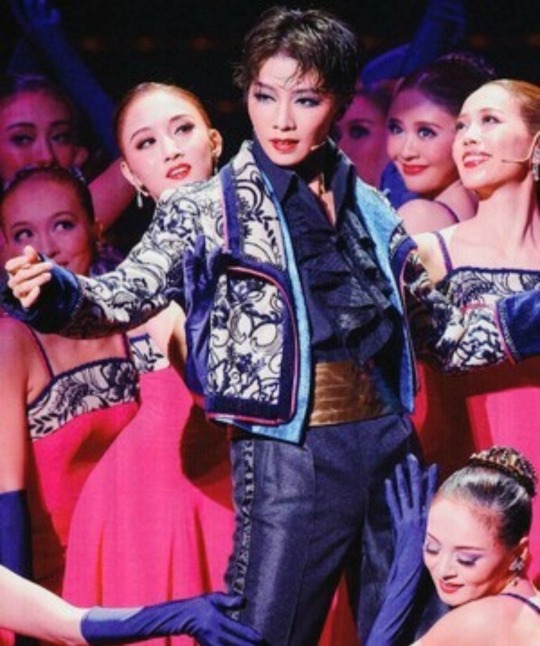
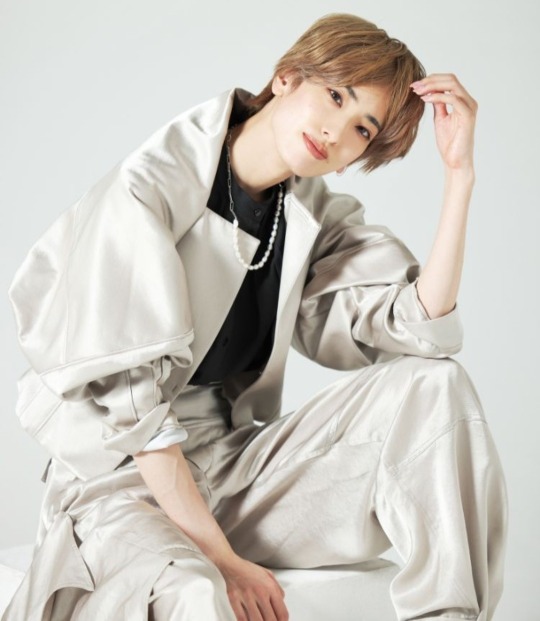
L to R: Rei Makoto in Tiara Azul (2024), Yuzuka Rei
For those into androgynous women
As you probably already know, Takarazuka's big selling point is that it's an all-female theatre company where the male characters are played by women. The actresses are expected to continue presenting that way off-stage, which in practice means a lot of handsome women with short hair in binders and men's clothing... Why that might appeal to people who are into androgynous women (or GNC/enby folks) is pretty obvious.
Reality Check:
Sadly, after "graduation" (i.e. leaving Takarazuka), nearly all such actresses will transition into feminine presentation and take on female roles. It's similar to the "lesbian glasshouse" idea in Class S yuri, but for gender non-conformity. That said, there are some notable counter-examples: Shion Yuu and Nanami Hiroki have basically refused to change their presentation after graduating (the latter still frequently plays male characters in both anime and stage productions), and things are more relaxed lower down the rungs too.
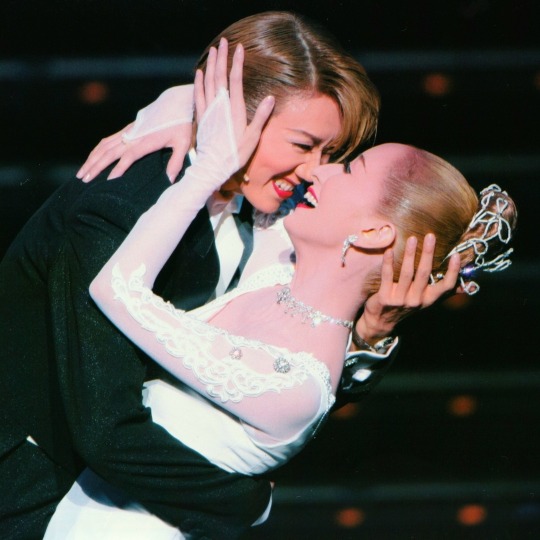
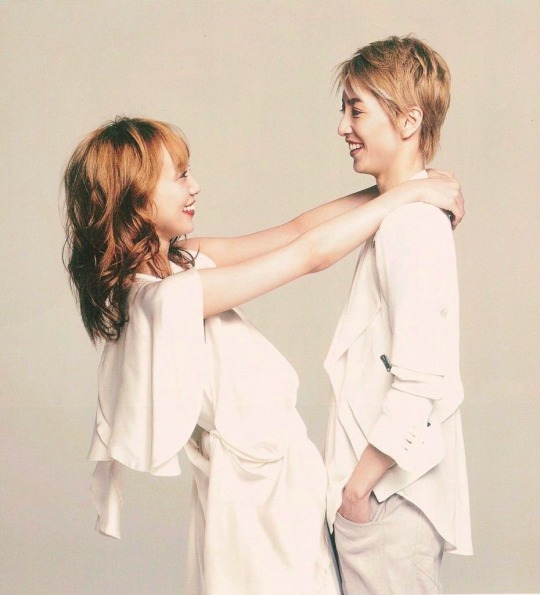
L to R: Wao Youka & Hanafusa Mari, Sagiri Seina & Sakihi Miyu
For those into butch/femme pairs
Just as roughly half of Takarazuka's actresses specialise in male roles (otokoyaku/男役), there is another half specialising in female roles (musumeyaku/娘役). On top of that, Takarazuka is split into five different troupes, and for any given production, the male lead and female lead are automatically assigned to that troupe's "top star" (leading otokoyaku) and "top musumeyaku" (leading musumeyaku) - the "top combi".
Unlike leading pairs in other theatrical traditions, the "top combi" concept extends to them being marketed as a pair in interviews, magazine features, TV programmes, etc. Just watch the mini TV special where Sagiri Seina and Sakihi Miyu visit Tokyo Skytree and Sumida Aquarium-- it's basically a date, and is described as such by the commentating TV announcer. Likewise, Wao Youka and Hanafusa Mari were interviewed about being a "golden combi" by women's magazine Fujin Kouron (though to be fair this was after they had, improbably, managed to win a Kikuta Kazuo Theatre Award - an award for individuals - jointly, for their "splendid performance as a combi" in 2004's Boxman).
Taken to its extreme, there have been cases where the Japanese public have been convinced that a top combi was dating, as with the immensely popular 1980's pair Daichi Mao and Kuroki Hitomi... It's no wonder that the actresses themselves frequently describe it as being like an arranged marriage.
Separately, due to certain reasons, it's practically part of the job description for top musumeyaku to adore their top star partners. This, in theory, inadvertently creates a safe space for any top musumeyaku who could be gay for their stage partners... Just to illustrate, during her graduation speech, Hinami Fuu repeatedly referred to her feelings for her top star partner Hokushou Kairi as koi (恋), a word specifically denoting romantic love, and nobody blinked an eye.
Reality Check:
Due to conservative attitudes in both Japan and Takarazuka itself, most actresses go on to marry men, including many of those named above. Vanishingly few are publically out, though former otokoyaku Higashi Koyuki (stage name Aura Maki) is a queer activist and was one half of the first same-sex couple to be married in Japan, and another former otokoyaku, Misuzu Aki, has been living with her female partner in Europe for years. Just, well, don't forget that being married to a man isn't necessarily evidence of heterosexuality.
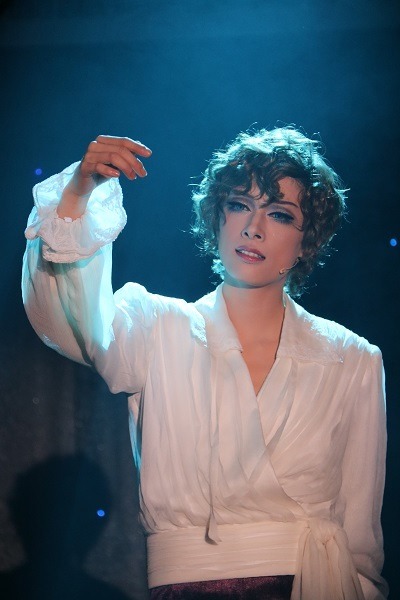
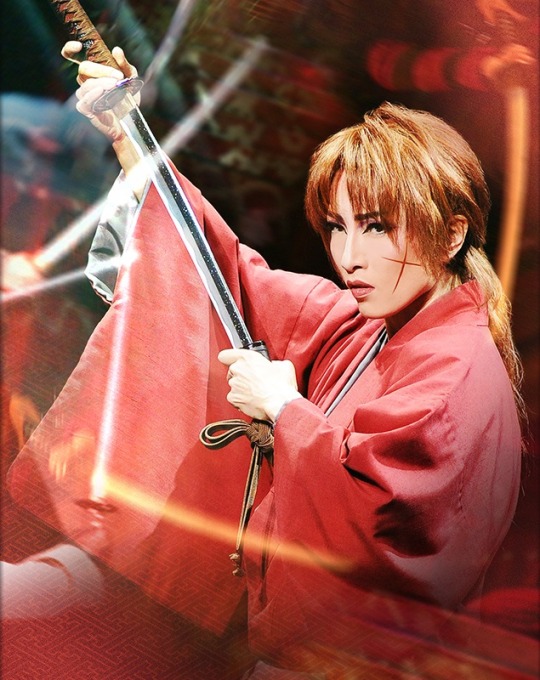
L to R: Asumi Rio in The Poe Clan (2018), Sagiri Seina in Rurouni Kenshin (2016)
For lovers of anime and manga
Takarazuka is probably best-known as the inspiration behind Revolutionary Girl Utena, Revue Starlight, Kageki Shoujo, and Sailor Moon’s Haruka and Michiru, but did you know that it also inspired seminal works featuring androgynous female leads such as Princess Knight? If you enjoy “prince-type” characters in yuri, you’ve got them to thank
Apart from inspiring anime and manga, Takarazuka also does quite a few animanga adaptations itself! Most famous are their Rose of Versailles musicals, but other popular adaptations include Ace Attorney, Rurouni Kenshin, Lupin III, Boys Over Flowers, and Hagio Moto’s bishounen vampire vehicle The Poe Clan. They’re also doing a Castlevania musical this year!
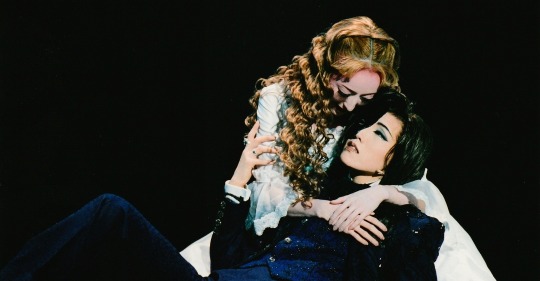
Wao Youka & Hanafusa Mari in Phantom (2004)
For the theatre nerds
Female Phantom of the Opera, duh
Jokes aside, Takarazuka’s unique position in the theatre world can't be overstated. As a rule, all-female productions are either smaller-scale, one-offs dependent on the work, or part of a theatrical tradition completely separate to Western-style plays or musicals (hello, Chinese Yue opera). Takarazuka is the exception: it offers productions comparable in size and scale (and budget) to the largest West End and Broadway musicals - it just so happens that it's all-female.
If the all-female aspect doesn’t excite you then why are you here, then let me emphasise again: Takarazuka is totally worth checking out as a production company in its own right. It is very much a part of the broader Japanese musical industry, and one of its powerhouses at that. Just take a look at some of these clips from past productions (all around 5 mins or less):
(a) Maeda Keiji - a musical loosely inspired by real-life samurai Maeda Keiji; features an uncannily convincing horse performed by two people in costume which needs to be seen to be believed (b) Ephemeral Love - a period piece about the doomed love between Prince Rudolph of the Hapsburgs and his lover Marie Vetsera (c) The Man Who Never Sleeps - a biographical musical about Napoleon Bonaparte (d) Casino Royale - an adaptation of the 2006 James Bond movie of the same name (e) BADDY - an off-the-wall sci-fi comedy featuring loads of velvet suits, silly shellfish outfits, and queerness.
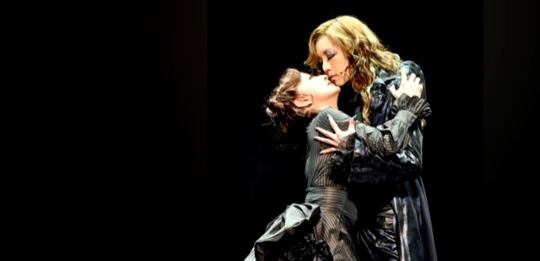
Wao Youka and Hanafusa Mari in Dracula (2011)
2. Random Queer-ish Trivia
It's pretty common for former otokoyaku to be cast in WLW roles: Sena Jun headlined the 2018 Japanese production of Fun Home, Otozuki Kei cameoed as a lesbian escort in 2022 LGBTQ-themed J-drama Kojinsa Arimasu, and Seto Kazuya played the owner of a lesbian bar in 2024 yuri J-drama Ayaka is in Love with Hiroko. (Incidentally, Sal Jiang, the original creator of Ayaka is in Love with Hiroko, has mentioned being a fan of Sena Jun when she was younger)
Otokoyaku are sometimes mistaken for men, with amusing results: Yuzuka Rei was thought to be a “host” by a passer-by while talking to her fans, and Houshou Dai has mentioned being hit on by a woman before. But the prize goes to Todoroki Yuu, who like many women once had to rebuff unwanted advances from a man—except in her case, he thought that she was a guy
Before entering Takarazuka, Sou Kazuho – eventual Snow Troupe top star – went to a co-ed school and had long hair. To her confusion, this didn’t stop her classmates from asking her to play a male character (possibly the male lead, IIRC) in the school play. They saw her as an otokoyaku even before she did!
Continuing with the high school theme, former Cosmos Troupe top star Wao Youka has boasted about how in her high school days, she received more Valentine’s chocolates than her brother, and in fact second-most out of her year. Important note: she went to a girls’ school
Speaking of Wao Youka, her 2011 Dracula (see photo above) - from @cryoverkiltmilk's “Cunt Dykecula” post - wasn't actually a Takarazuka production! Since Wao was acquainted with and later married its composer Frank Wildhorn, some assume he was the one to cast her, and that Hanafusa Mari was brought in due to being her old stage partner. But Wildhorn had wanted Wao to play the female lead. It was she who insisted on Dracula. And Hanafusa wasn't just a third party... she had been Wao's manager since 2007, having retired from the stage after graduating and only just returned with 2010's Dietrich. (She played Edith Piaf, legendary chanson singer and “very good friend” of bisexual icon Marlene Dietrich, played by Wao.) Dracula was the swan song for their partnership, with Hanafusa going on to conquer the Japanese musical industry as she had Takarazuka-- but it marked the first, and so far only, time a top combi performed as romantic partners after graduating.
On a separate note, renowned queer photographer Leslie Kee has been responsible for taking the cover portraits for Takarazuka's offical monthly publication Kageki (歌劇) since 2010. You should definitely check out his ongoing "Out in Asia" project – he's taken literally thousands of photos of out queer people in Japan, Singapore, and Taiwan in a bid to raise visibility
Lastly, in November 2015, Takarazuka City became the first Japanese city outside of Tokyo to announce its support for same-sex partnerships… though this may of course be a total coincidence.
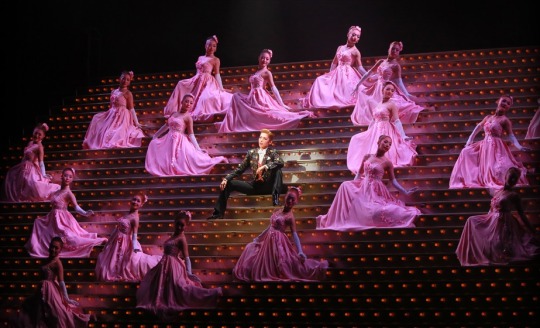
Flower Troupe in Takarazuka Fantasia (2015 Taiwan tour)
3. Where to Start?
Nearly all Takarazuka shows since the 1990's are available on DVD (earlier ones are on VHS), and these recordings are very well done - they have great video and audio quality, are well-edited, and use a large number of camera angles
They do livestreams and live broadcasts of performances as well! You can watch a livestream from your mobile or PC by spoofing your location. For a more communal experience, if you're in Japan, Taiwan, or Hong Kong, you can catch live broadcasts of Grand Theatre performances at a local cinema
VODs of selected productions are available on various platforms, including Amazon Japan, though this still requires location spoofing. If you're actually living in Japan, you can also consider subscribing to Takarazuka's official TV channel (yes, that's a thing) Sky Stage - they do a lot of reruns of past performances
With that done, here are several recommendations if none of the productions mentioned throughout the post caught your eye!
(a) Elisabeth - Michael Kunze and Sylvester Levay's musical about Empress Elisabeth ("Sisi") of Austria and the fall of the Hapsburg Empire, featuring an (inevitably very sexy) personification of Death and fantastic music. Takarazuka has done many, many productions of this, so just search them and pick whichever looks most appealing - but you won't go wrong with the 2014 Flower Troupe production, which has a very strong cast and a more refined version of the staging
(b) Phantom - Arthur Kopit and Maury Yeston's adaptation of Phantom of the Opera. Though obviously not the ALW version, the music is actually pretty great and Takarazuka goes all-out on the costumes and stage magic. All the productions are wonderful, but my favourite is the original 2004 version (which is also the one which went viral on Tumblr before - thanks, @wheel-of-fish!)
(c) Rose of Versailles - no list would be complete without Takarazuka's representative work, buuut I wouldn't necessarily recommend starting here if you're looking for a typical musical experience. There are loads of productions to choose from - note that these are split between a version focused on protagonist Oscar, and another focused on Marie Antoinette and her lover Fersen - but the 1991 Moon Troupe production is my personal pick
(d) Casanova - a light-hearted romp in which Casanova is reimagined as a charming playboy who falls for the feminist-minded daughter of Venice's mayor... only, she doesn't know his real identity. The very catchy music was commissioned from Dove Attia, the producer behind French musicals Mozart, l'opera Rock and 1789: Les Amants de la Bastille. Check out the performance digest here!
(e) Shinjuu: Koi no Yamatoji - Takarazuka puts Chikamatsu Monzaemon's tale of the doomed love between a commoner and a courtesan to a classic rock score (see this clip!). An Edo-era work that doesn't just focus on samurai and nobility, this romantic tragedy offers a grounded look at the social pressures of the time. (Though if you do want to watch something focusing on Japanese nobility, I highly recommend Takarazuka original and guaranteed tearjerker Hoshiai Hitoyo.) There are quite a few productions of this, but I've only watched the 2014 Snow Troupe one, which was very good.
Thanks so much for reading! Please feel free to DM me or send an ask if you have any questions~ I definitely want to do a follow-up post on musumeyaku, and maybe delve into Wao and Hanafusa's history (it's messy, but fascinating)... but we'll see!
#takarazuka#musicals#theatre#elisabeth das musical#phantom of the opera#rose of versailles#butch#yuri#queer#ayaka is in love with hiroko#wlw recommendations#takarazuka revue#musicaltheatre
1K notes
·
View notes
Text
Will we ever get anything quite like Code Geass again?
I don't think it's possible.
Code Geass is Japanese nationalist propaganda disguised as a global political drama, disguised as a military mecha show, disguised as yaoibait, disguised as a teen melodrama, disguised as a high school romcom, disguised as a Pizza Hut commercial...
...except those layers aren't layers at all, but are instead comingled in a giant snake ball of insanity.
The lead writer, Ichirō Ōkouchi, only ever worked as an episode writer for other shows prior to Code Geass, and never took the helm of an anime series ever again. And it shows. [EDIT: Several people have pointed out his other lead writing credits to me. So I misread Wikipedia—sue me. I maintain that this guy is a better episode writer than he is a lead writer.]
The minute-to-minute pacing is impeccable from a mechanical standpoint, with tension and stakes rising to ever-higher peaks, balanced out by the slow simmers of the b-plot and c-plot. It keeps the viewer on the edge of their seat at all times. Meanwhile, the large-scale plot is the most off-the-wall middle school nonsense I've ever seen, continually surprising the viewer by pulling twists too dumb to have ever have been on their radar—and therefore more effective in terms of raw shock value.
"Greenlight it!" was the mantra of this anime's production. It must have been. It has, in no particular order, all of the following:
Character designs from CLAMP, the foremost yaoi/BL group in Japan at the time—for characters who are only queer insofar as they can bait the audience, and only straight insofar as they can be more misogynist to the female cast.
Speaking of the female cast, hoo boy the fanservice. We've all seen anime girls breast boobily, with many cases more egregious than Code Geass, but there's something special about it happening immediately after—or sometimes in the middle of!—scenes of military conflict and ethnic cleansing.
Pizza Hut product placement everywhere, in every conceivable situation. High-speed chases, light slice-of-life scenes, intimate character moments, all of it. Gotta have Pizza Hut.
The anime-only Pizza Hut mascot, Cheese-kun. He wears a fedora.
The most hilarious approximations of European names—which I would love to see more often, frankly. Names like, I dunno, "Count Schnitzelgrübe zi Blanquezzio."
A depiction of China that is wholly removed from any modern reality, with red-and-gold pagodas, ornamental robes, scheming eunuchs, and a brainwashed child empress. There's a character named General Tsao, like the chicken.
Inappropriate free-form jazz in the soundtrack, intruding at the most unexpected times.
A secret cabal not unlike the Illuminati, run by an immortal shota with magic powers, holding influence all across the world, at the highest levels of government. They matter for approximately three episodes.
An unexpected insert scene of a schoolgirl using the corner of a table to masturbate. She's doing it to thoughts of her crush, the princess Euphemia—because she believes Euphemia to be as racist as she herself is, and that gets her off. This interrupts an unrelated scene of our protagonist faction planning their next move, which then resumes as if uninterrupted.
Said schoolgirl, in a fit of hysteria, threatens to detonate a worse-than-nuclear bomb in the middle of her school. She then goes on to develop an even more destructive version of that bomb, and become a war criminal, in a chain of cause-and-effect stemming from the moment she finds out that Euphemia wasn't actually that racist.
A character called "the Earl of Pudding."
A premise that asks us to believe that the name Lelouch is normal enough that he didn't need to change it when he went into hiding as an ordinary civilian. "No, that's not Prince Strimbleford von Vanquish! That's our classmate, Strimbleford Smith."
The collective unconscious, a la Carl Jung, within which the protagonist fights his villainous father for control over the fate of humankind. After this is over, the anime just keeps going for about ten more episodes.
An episode in which a mech tosses a giant pizza.
A gay yandere sleeper agent who can manipulate the perception of time.
Chess being played very badly, even to the untrained eye. Lelouch frequently checkmates his opponent by moving his king. This goes hand-in-hand with the anime's crock of bad chess symbolism.
A fictional drug that can most succinctly be described as "nostalgia heroin."
Roller-skating mecha in knightly armor, and some of the most sickass mecha fight choreography that I've seen.
I could go on and on, but I think you get the picture. This anime is what the average Westerner in 2006 thought anime was, and it was made in a confluence of factors that cannot be replicated. I've never had so much fun watching something that I found so... insulting. Repugnant. Ridiculous. Baffling. I love it sincerely.
Catch me cosplaying Lloyd Asplund at a con sometime, or maybe even the big gay loser himself, Lelouch vi Britannia.
#code geass#anime#lelouch vi britannia#rolo lamperouge#nina einstein#kallen kozuki#lelouch lamperouge#clamp manga#lloyd asplund
5K notes
·
View notes
Text
First episode of ‘Agatha All Along’ down. Aubrey Plaza is playing a character that’s… perfect for Aubrey Plaza. Creepy but captivating and very very queer. No surprise there. Katheryn Hahn, on the other hand, is playing a character that reminds me of a young Wynonna Earp. Not just her appearance, but her charisma too. Her character humour - snappy one-liners that you might have to play back to catch in their full context and to be able to laugh along unless you’re as quick-witted as the writer and actor is - to which I’m definitely not. There’s still dialogue and references from the show ‘Wynonna Earp’ that I don’t get to this day no matter how many times I hear them. It’s just far beyond me to catch on to the tag-team comedic duo of Emily Andras and Melanie Scrofano. But yeah, there’s definitely a lot of that going on. All this clever quick-witted humour with this Agatha character that I’m picking up on right off the bat makes this character seem much more worldly and dynamic than I’m getting from the story/plot at the moment.
That’s good. I like what I’m seeing so far. It’s just getting my slow brain to catch up to all that’s going on and being able to follow the fast-paced narratives.
It’s clear that both characters in the WLW ship are lead characters. That’s wonderful because that’s very rare. That’s definitely going to help my reception to it a lot because it means both these lead characters will have significant individual representation and development with which to build a solid foundation for their dynamic together and relationship beyond something romantic - which is what I look so damn hard for but can’t ever seem to find in this day and age. So I’m very happy about that. But - of course - it all depends on how they evolve. That’s what keeps my interest. Not the set ups.
Also love that they’re heavily enemies-to-lovers - right down to the classic motif of knife to the chest intensity.
They’re already dripping with authentic chemistry, compelling tension, sexual innuendo and subtext.
That’s the draw and it’s drawn a lot of people in. But the challenge comes in keeping that draw going and going. That’s what I’ll be paying very close attention to with watching each and every episode. Zoning so far into the characterization and how it doesn’t feel like it’s forced. Because I can immediately tell the difference. Trained eyes and ears from engaging in the best representation.

#agatha all along#seekest thou the road#agatha and rio#agathario#agatha harkness#katheryn hahn#rio vidal#aubrey plaza#lead characters#enemies-to-lovers#female representation#wlw representation#queer representation#marvel television
49 notes
·
View notes
Text
A Brief History of Queer Representation in Modern Kdrama

Earlier this week, totally unrelated to Heesu in Class 2, @twig-tea and I were making a list of kdramas with proper queer representation, because Twig loves to track queer things and I love to make highly specific lists. In light of all the discussion around Heesu and its appeal to a mainstream kdrama audience, we thought it would be helpful to share as context for what Heesu’s creators set out to do, how it compares to Love in the Big City and its goals, and why both shows are so significant for those who are not as familiar with this media landscape. We wrote the below together (strap in, folks, it's a long one).
As always, let us be clear what we are talking about with this list. We’re only looking at modern mainstream kdrama, so this list is not inclusive of Korean queer cinema or QL dramas, both of which have a rich history of their own. And when we say queer representation, we mean canonically queer characters that are acknowledged as such in the text of the show, if not by saying the words, at least by openly acknowledging same sex attraction. If there’s anything we know about queer people on the internet, it’s that our community can read gay subtext into anything, but that’s not what we’re doing here. For this list we are only interested in depictions of LGBTQ+ people that are clear and spelled out for anyone watching a show. In addition, for the purposes of this list we are talking about intentional inclusion of queer characters with a proper role in the story, not nominal nods to queer people existing (like every Hong Seok Cheon cameo in a drama), comedic gender bending without real reckoning with sexuality (ala The King’s Affection), use of queer people as the butt of a joke (glaring at you Vincenzo), queerness in psychosexual dreams to titillate and generate buzz (hiiiii Friendly Rivalry), or subtextual gay tension between two same sex actors who happen to have chemistry (waves hello to The Devil Judge). The point of this exercise is to chart the evolution of significant queer representation in kdrama—both good and bad—not to document every gay character that ever appeared for two seconds on screen. That said, while Shan has watched several hundred kdramas and Twig has tried to watch everything gay on the planet, it’s possible we missed something that should be here, so let us know if you think we did (though please do mind the criteria and don’t send us an impassioned essay about why Beyond Evil should count).
With that, let’s begin our walk through of the last two decades of queer characters in kdrama.
Coffee Prince (2007)

Among the most famous dramas on this list, Coffee Prince kicked off queer rep in modern kdrama with a classic gender bender in which Go Eun Chan, a girl, pretends to be a boy for Reasons. But what made it stand out is that her love interest falls for her while he still thinks she’s a man and has a whole sexual identity crisis and bisexual coming out process. Choi Han Gyul (and Gong Yoo), you will always be famous! This show was sincerely groundbreaking, not only for depicting a male romance lead struggling with his sexuality, but also including lots of gender fuckery for the female lead. It’s still one of the most significant queer kdramas ever made.
Life is Beautiful (2010)

This show is notable for how high it set the bar and how nothing has reached it since. Yang Tae Sub is our central character in this 63-hour ensemble family drama, and his arcs struggling with the closet, falling in love, coming out, commitment, and marriage (yes: marriage! In 2010!), are surprisingly realistic and touching without being too cliche. Kyung Soo and Tae Sub start as a casual hookup, and they have to recalibrate as their feelings change (and yes, they kiss on screen and the show is clear that they have sex throughout the series). They fight, they make up, and as their relationship deepens they have other problems in their lives they support one another through—their gayness is not the only or even the most interesting thing about them. It’s also notable that both of these actors (Song Chang Eui and Lee Sang Woo) were established kdrama stars before taking these roles.
Secret Garden (2010)

This het romance features a side character (played by our beloved Lee Jong Suk) who is a young musical prodigy pursued for his talents by the second lead, a senior musician. Over the course of the story we learn that he’s gay and harboring feelings for his would-be mentor. His plot is minor, but he ends the story happy and successful in his career, if not in a relationship. It’s small scale representation in the grand scheme of things, but one of only a handful of decent depictions of a gay person in kdrama at that point.
Reply 1997 (2012)

This wildly popular drama (at the time, it was one of the highest rated cable dramas in history) that spawned two follow-up iterations features a gay character, Joon Hee, who is in love with his long time best friend, Yoon Jae, and confides his feelings to their other best friend, Shi Won. Of course, this show is ultimately Yoon Jae and Shi Won’s love story, so Joon Hee does not get his happy romance ending, but his friends and the show treat him with kindness and compassion, and his character was well received by audiences.
Reply 1994 (2013)

Similar to its predecessor, this drama featured a side character with a gay subplot, but this time it was more about questioning his identity. Bingguere is a character whose arc is all about his confusion and indecision, and that extended to his sexuality when he struggled to understand his attraction to the male lead. Ultimately, he moves past those feelings and we learn his partner in the future is a woman, and the drama doesn’t really clarify where his sexuality landed. It’s kind of weak in terms of explicit queer rep, but showing a man grappling with his sexuality in a very popular family drama still feels significant.
Seonam Girls High School Investigations (2014)

While most of their content is limited to two episodes of this 14-episode high school drama, Eun Bin and Soo Yeon have, to our knowledge, the first lesbian kiss on Korean television, which earns them a place on this list. They are an established couple struggling with how their relationship is a risk for them (because it can be and is used against them). Their relationship doesn’t survive to the end of the series, but they are treated with compassion and their humanity is underscored by the narrative. They also spark an important conversation among the main characters about whether they should be helped because they’re gay, which was a little better intentioned than it was executed, but the show had the spirit.
Perseverance Goo Hae Ra (2015)

In a show about aspiring musicians forming a group to take a second shot at stardom, Jang Goon (portrayed by solo idol Park Kwang Seon) is one of the core group members with a heartwarming arc about acceptance. His story is about his father coming to terms with him being an idol and being gay. He has a one-sided confession scene that is decently done, and the scene where his father accepts him knowing the truth (after having been outed against his will) is genuinely moving. It was also touching to see the girl who originally crushed on him support him once she found out about his sexuality.
Hogu’s Love (2015)

This drama was considered progressive for its time, as its core plot is about Hogu, a man who decides to support his first love when he finds out she is pregnant with someone else’s child. In addition to that, side character Kang Chul has an arc where he experiences attraction to Hogu and tries to sort out his feelings, considering whether he identifies as gay before ultimately deciding he does not. It’s not the best rep we’ve ever seen, but it was part of an interesting attempt by a drama to explore complicated social and identity issues.
The Lover (2015)

Lee Jun Jae and Takuya (played by Lee Jae Joon who was also in the gay film Night Flight (2014) and Takuya of jpop group CROSS GENE) are roommates in this series about four couples in an apartment building. Their story starts as a comedy, in which Jun Jae and Takuya end up in ship moments that are played off by the narrative as jokes and misunderstandings, but then they catch feelings for real. We see one of the characters struggle with his queer awakening and there is a happy ending. Using the actors’ real names was a choice, and led to some seriously disruptive RPF shipping; but it was refreshing to have an active idol not only play gay but in a romance with a happy ending.
Prison Playbook (2017)

Another ensemble show with a queer side character; Loony, one of the main character Je Hyuk’s cell mates, is notable for his queerness not being used as a joke and not being the core of the character’s arc. Instead, this character struggles with addiction and how that affects his relationship, which is only incidentally gay. His story is moving and well developed, especially considering the size of this cast, but it doesn’t get a ton of screen time.
Romance is a Bonus Book (2019)
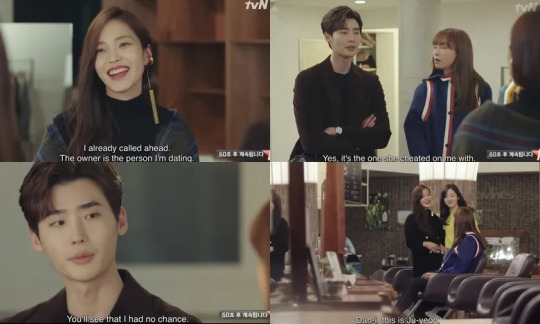
The queer rep in this drama is minor but overall positive, as we learn that the male lead Eun Ho’s ex-girlfriend, who he is still friendly with, ended their relationship because she fell in love with a woman. The show presents her as a lovely person who helps the female lead several times and is happy in her lesbian relationship, and we even get to see her with her partner briefly. A small win for sapphic representation in a very popular Netflix drama.
Moment at Eighteen (2019)

Jung Oh Je (RIP Moonbin) is a side character friend of the main lead. His sexuality becomes part of the plot when he is confessed to by a friend of the female lead, and he admits that he has a crush on the second male lead (Ma Hwi Young). While the characters in the show are mixed in their response, it’s clear the story is on the side of treating Oh Je with compassion.
Be Melodramatic (2019)
youtube
This is an ensemble show centered on a group of friends who move in together to support a grieving young woman, Lee Eun Jung, and one of the housemates is her younger brother Lee Hyo Bong, a gay musician with a long-term partner. He is a side character and his most significant plot is about supporting his sister, with his sexuality and relationship part of his characterization rather than an active story thread. It’s a positive depiction and the way his sexuality is presented as just part of who he is felt significant at the time.
Love with Flaws (2019)

Joo Won Suk (RIP Cha in Ha) is one of the FL’s older brothers, and while not the focus of the drama he gets his own fully developed arc, including the mentorship of queer side character Choi Ho Dol. The queer rep in this show covers suicidality, the loneliness of the closet, bullying, solidarity, and fear of parental shame. That makes it sound depressing, but it’s a hopeful story about the character moving out of depression and into self-acceptance, has one of the best scenes depicting gay acceptance from a father in any show, and both Won Suk and Ho Dol have a happy ending (including for their romance).
Itaewon Class (2020)

The first drama on this list to feature a transgender character, Itaewon Class is about a group of social misfits trying to launch a restaurant on a trendy street in Itaewon. Ma Hyun Yi, a transgender woman saving money for her gender affirming surgery, is among the gang. Her story is not a big focus for the drama, but she gets a nice arc about coming into herself and gaining recognition for her talents as a chef, and the other characters always respect her identity. It’s pretty solid representation for a side character.
Sweet Munchies (2020)

This drama tries to tackle the problems of homophobia and appropriating queerness but misses the mark on both. The queer character in this show, Kang Tae Wan, is here to function as a driving force and conscience for the main male lead and female lead; he’s essentially the second lead but never had a chance (though he didn’t know it, since the main lead is pretending to be gay for clout). Tae Wan is a good character, but the narrative doesn’t care much about him or about queer people in general, it’s focused on how heterosexuals experience queerness. Not exactly amazing queer representation, whatever its intentions.
Run On (2020)

This drama features both a gay character and an asexual character, both of whom are written respectfully and get proper coming out scenes. There is also some messiness around one of the main characters appropriating queer identity as a way to avoid the pressures of her patriarchy, and the drama knows she’s wrong for that. This was one of the first instances of a kdrama acknowledging queer people as a regular part of the world around us and not singular oddities, and it was nice to see multiple facets of queer representation in one show.
Mr. Queen (2020)

This gender bender retains its place on the list because the main character (a man who awakens in the body of a Queen during the Joseon dynasty) openly struggles with his gender dysphoria as well as what it means that he’s attracted to a man, and these struggles are present for the bulk of the show. The character also has sex with both men and women while in that body. It’s one of the better representations of gender swap and feels queer, even when the relationship on screen has the guise of heterosexuality.
Mine (2021)

In this drama about ambitious women married to powerful men who struggle to break free from their constraints, one of the main characters reunites with her first love—another woman. The drama follows Jung Seo Hyun as she struggles to acquire the power she needs to live as she wants, and she ultimately achieves her goal, reuniting with her lover at the story’s end. It’s the first kdrama with a lesbian character in a major role who gets her happy romance ending.
Move to Heaven (2021)

Despite only being featured in episode 5, this was a good story that garnered a lot of attention in a popular Netflix drama, so for cultural impact reasons alone it belongs on this list. We start the episode with Jung Soo Hyun’s death, but this is a show about finding closure after death, so for once this death doesn’t feel like bury your gays. This is a compassionate tragedy in which we see how fear held Soo Hyun back from his relationship with Ian Park while he was alive, but his belongings at death indicate he was getting ready to face his fear and move to the US to marry Ian after all. Through the main characters of the show, Ian gets the closure of knowing Soo Hyun loved him.
Nevertheless (2021)

Yoon Sol and Seo Ji Wan have a typical plot for side characters (they’re in the female lead’s friend group) with a friends-to-lovers arc that depicts the fear and frustration when both friends are closeted and uncertain about risking the friendship but reach the point where they can’t pretend anymore. Since they’re both women, this felt pretty radical. They got a good romantic arc and a happy ending, if not a lot of screen time.
Under the Queen’s Umbrella (2022)

In this sageuk, the fourth prince is living a double life, hiding away makeup and women’s clothing that they wear in secret. The character is depicted as trans, but given the setting, explicit language and modern terminology (including altered pronouns) are not used in this side plot. When the prince’s mother finds out, she supports her child to have an artist paint a portrait of their true self, and ultimately, the prince leaves the royal family to go live a more authentic life in isolation in a bittersweet resolution.
A Time Called You (2023)

The queer rep in this drama comes in the form of a brief backstory montage for two gay characters, one of whom (Yeon Jun) is in a coma. We learn that he ended up in this state after getting into a car accident while in the process of confessing to the guy he mutually liked (Tae Ha), who was killed in the accident. From there, Yeon Jun’s body is taken over by a heterosexual character (it’s a whole time loop thing). This entry is mostly notable for featuring a high profile cameo from Rowoon playing Tae Ha, and unfortunately, for being a fairly textbook example of the bury your gays trope. In 2023!
Wedding Impossible (2024)

This disaster of a drama purported to finally feature a gay character in a prominent role that drove the narrative—in a story about Do Han pretending to marry his longtime friend to avoid being forced to marry another woman—but Do Han ended up a minor side character in his own story when the show chose to focus nearly all its attention on his brother’s het romance. Worse, the other characters treated him terribly and the story blamed every problem on his sexuality. This show was straight up homophobic and it was a significant regression for queer depictions in mainstream Korean media.
Bitter Sweet Hell (2024)
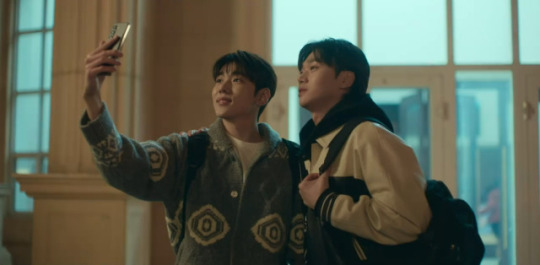
image credit @respectthepetty
Choi Doi Hyun (played by Park Jae Chan of Semantic Error) is the closeted son of the main character, struggling with how hiding his secret affects his school life and his relationship with his family. His story ends happily with Jun Ho in the US, which felt like a win after the above history with kdrama, but because his secret being his queerness is hidden for most of the story, we don’t get to see it inform the narrative much except in retrospect.
Squid Game 2 (2024)

The most recent entry on our list features Park Sung Hoon as Hyeon Ju, a transgender woman who enters the life or death game at the center of this drama to earn money to move to Thailand and get gender affirming surgery. While her inclusion wasn't entirely groundbreaking, Hyeon Ju was a well-developed character with a sympathetic backstory who quickly became a fan favorite, notable given Squid Game's popularity and broad international audience.
Bringing Better Queer Stories to Mainstream Drama Audiences

With all that context established, we have been contemplating how queer creators in Korea can reach a wider audience with their stories and ensure queer representation in kdrama is both more common and more authentic. We look to Love in the Big City and Heesu in Class 2 as a start, as we would argue that both shows exist in the gray space between mainstream kdrama and kbl. They both leverage kdrama style and structure to tell queer stories that include, but are not limited to, gay romances. They both had unusual distribution and battled to even get released and in front of an audience, with LITBC rushing its episodes out amidst public protests and Heesu sitting on the shelf for two years before being quietly released on a streaming platform. And they both had goals to reach an audience beyond the usual BL viewers, albeit with wildly different tones and themes in their stories. The BL audience is too niche to effect the social change that queer creators are seeking, and the limited runtime, genre tropes, and laser-focus on romance means it is harder to make wider social and cultural points in a BL story (it doesn’t hit the same when gay characters are treated as human in a story that takes place in the no homophobia BL bubble). And as we’ve seen from this walk through the past, there are real limits to queer representation that is not created by queer people or informed by their lived experiences.

As you can see from reviewing this list, these two shows were the first kdramas in well over a decade (after the only other example, Life Is Beautiful) to center on a gay main character whose journey drove the story, and they were doing this in the context of a media landscape that rarely elevates queer people beyond minor side plots, still regularly fumbles on respectful representation, and in which representation seems to be getting worse. Love in the Big City set out to show a young queer man’s life in all its glorious messiness. Go Young was not an easy character, and the show did not hold back on his flaws or shy away from either the joy or the struggle he found in his sexuality. Heesu is about a younger character and so his struggles are centered around coming of age and first love, but it similarly depicts a beautifully flawed young gay man coming to terms with himself and asks the audience to empathize with and care about him as his loved ones in the story do. Where LITBC uses a unique storytelling structure to draw in the viewer and highlight what makes Young’s life feel different, Heesu roots itself in familiar drama beats and queer-coded side plots in the hopes that the audience will see and be comforted by the familiar in Heesu’s world.

Both of these stories, in their own way, speak to a mainstream audience and ask for queer existence and queer humanity to be acknowledged. And this does not make them problematic as queer works, because they accomplish their goals of speaking to a wider audience while still being true to queer experiences. Given how scant decent queer representation has been in kdramas over the last twenty years (consider the size of the list above against the fact that there are well over 1500 modern kdramas, and so few of the above listed characters are mains or even significant sides in these dramas), more shows like LITBC and Heesu are needed to bridge this gap. We sincerely hope they find the support they need to get made.
#kdrama#queer media#lgbtqia+#love in the big city#heesu in class 2#long post#no seriously the longest post#coffee prince#life is beautiful#reply 1997#reply 1994#secret garden#seonam girls high school investigations#perservance goo hae ra#hogu's love#the lover#prison playbook#romance is a bonus book#moment at eighteen#be melodramatic#love with flaws#itaewon class#sweet munchies#run on#mr queen#tvn mine#move to heaven#nevertheless#under the queen's umbrella#a time called you
315 notes
·
View notes
Text
when I say riverdale is genius I truly mean it because what other show's creator would perpetuate a twenty year long revenge scheme over a cease and desist he received for writing a queer play (which included serial killers, of course) about the main character of a decades old comics series he would later acquire the intellectual property rights to that ultimately culminates in making every single character from said comics series, no matter how minor, coming out as queer in some capacity, INCLUDING having the two female leads fall in love in the shows final season. none of you understand true art and it shows
4K notes
·
View notes
Text
Why does Marvel have this amnesia towards their projects pre Disney plus? Every year they’re talking about “gayest tv show yet” or “first gay character” like they didn’t have Karolina and Nico from Runaways in 2017 in an explicitly canon lesbian relationship.
And the fans are just as bad. The incels calling everything woke DEI nonsense when marvels shows c.2013-2019 were probably the best tv marvel has put out while also having quite diverse stories.
Now they purposely rate any female lead project poorly, purely because they expect less from women. But shows like Jessica Jones, Agent Carter, Agents of S.H.E.I.L.D were really popular when airing.
Marvel used to focus on Black stories, have disabled/ neurodivergent characters, explicitly queer charcters, conversations about rape and PTSD and more! So why have they forgotten that they made these high quality shows? And why are the fans now having such a negative reaction to anything that’s not white male lead?
#marvel#marvels cloak and dagger#marvels runaways#jessica jones#luke cage#the punisher#agents of shield#iron fist#daredevil#agent carter#legion#the gifted#agatha all along#ms marvel#she hulk#echo
451 notes
·
View notes
Text
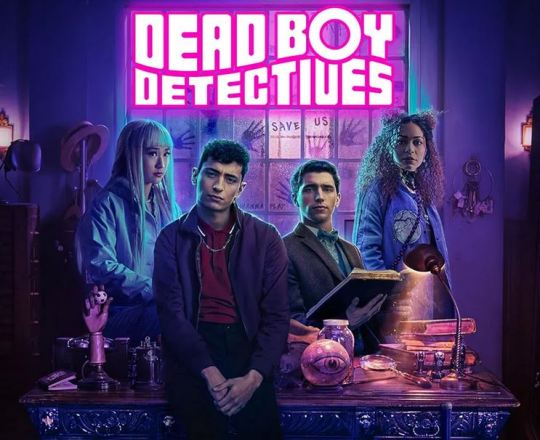
Alright. It is time. Buckle up.
Why you should be watching Dead Boy Detectives: the targeted-specifically-at my-readers edition.
Meet the leads, our two ghost boys:
Edwin Payne: Fussy, repressed intellectual type from the Edwardian era. Exceedingly gay for his partner and best friend. Tortured in hell for seventy years on a technicality because he was ritually sacrificed as a prank gone wrong. Endearingly awful at people and dealing with emotions or his own wants.
Charles Rowland: Impulsive, people-pleasing wildcard from the 80s. Heart eyes 24/7 at his best friend but has zero self-awareness. Badly abused by his asshole of a father. Beaten to death because he saved a kid from bullies. Endearingly awful at sorting his own emotions or talking about his problems.
Some highlights:
/slaps hood you can fit so much trauma in these two
Both leads get sobbing breakdowns that happen on screen. The actors are incredible at crying
Both leads get much-needed hugs
The absolute devotion between the two of them. The shared history that lives in their dialogue and how they work together like people who have been each other's Most Important Person for literal decades
I mean, I'm talking in-canon Orpheus and Eurydice reference level of devotion here
The protective way Charles puts himself physically between Edwin and damn near every threat in the show
They're just fun together. Their interactions and banter and how they work as a team is a delight
Their shared plot arc literally involves them learning to talk to each other and communicate more so that they can be there for one another about their respective issues
The symbolism. God. They are metaphorically and literally one another's light in the darkness
But what about stuff that isn't the main duo? Just wait, there's more:
This show is unabashedly, unapologetically queer. It's there in the text and the subtext. The whole show lives and breathes it
So many good, complex, well-written female characters. The Bechdel test gets blown straight out of the water in episode one and they never look back. Headstrong amnesiac psychic learning to be a better person! Quirky meta commentary matchmaker! Cynical lesbian butcher! Delightfully sadistic witch! They are all amazing.
[audience voice] But I'm here for the hurt/comfort. How can I whump ghosts? Worry not, my friends. Canon has you covered. Not only are there ways, there are ways that happen on-screen. The hurt/comfort and rescue are also on-screen. Yes, it is amazing
Absolute chaos, really cool supernatural cases and creatures, a surprising amount of humor, charming writing, and a cast that absolutely nails it on the acting and chemistry
There is an extremely suggestive trickster type who is also the king of cats. He's a cat in human form. He hits on Edwin nonstop. Charles gets blisteringly jealous
All of the leads have well-thought-through, fully developed, emotional character arcs. They're all messy and flawed and sometimes lash out in their pain, but at turns can be incredibly supportive and kind and loyal
A character who is a crow who is also a boy, who is tortured by his witch/creator and also is crushing hard on one of the leads
There are so many incredible details in the setting, costume choices, prop decisions, etc. that you only catch after you know what it's laying the groundwork for. The level of care that went into this show is phenomenal
It's only eight episodes. The time investment barrier to entry could not possibly be lower
Anyway, tl;dr, if any of this sounds appealing to you, you should give this show a watch.
Dead Boy Detectives is well worth your time. It's easily my favorite show in years.
#dead boy detectives#dbda#dbda spoilers#edwin payne#charles rowland#payneland#whump#hurt/comfort#lgbtqia#netflix
1K notes
·
View notes
Text
"Hotel Reverie": A heartbreaking simulation of Love and Grief
(Spoilers ahead)
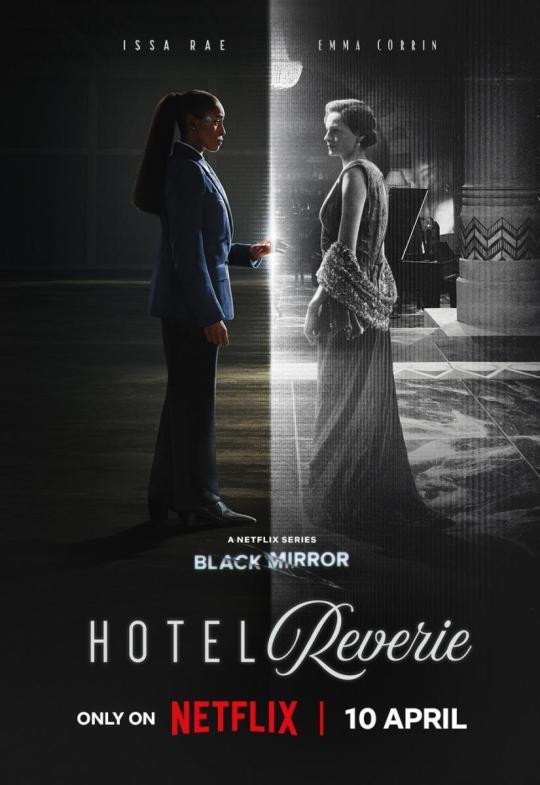
In its seventh season, Black Mirror quietly delivered what may be one of its most emotionally devastating and thematically rich episodes to date: Season 7, episode 3: “Hotel Reverie.”
On the surface, it seems to echo the show’s usual motifs—technology, simulation, AI, identity. But beneath its layers, its grayscale glamour and eerie premise lies something far more intimate: a queer love story about agency, performance, memory, and the ache of loving something that was never supposed to be real.
And it’s this contrast—between what is scripted and what is felt—that gives Hotel Reverie its haunting, aching brilliance.
The episode follows Brandy Friday, a Black actress who, despite her fame, is creatively stifled and emotionally detached from the roles she’s typecast into. She craves something deeper, something immortal—a performance that doesn’t just live on screen but lives in the hearts of those who witness it. She mentions all time classics like Casablanca and so much more.
That opportunity comes in the form of a film company rebooting Hotel Reverie, a 1940s romantic classic, if I remembered it correctly. Through advanced AI-simulation technology, they don’t recreate the film around Brandy but instead they drop her inside it. Fully immersed, Brandy’s consciousness becomes the character Alex Palmer, while the simulation populates itself with ultra-realistic AI versions of the original cast, including the tragic female lead, Clara, played by a synthetic version of late film icon Dorothy Chambers. The catch was Brandy never received the full briefing or protocol, she didn't know it would be unrealistically real...She didn't know Clara would feel so human and she certainly didn't expect to fall in love.
The episode is about technology, yes but more than that, it's about the quiet war between authenticity and performance, and how queer love is often forced to live between the two.
Clara, the AI was built from Dorothy’s old performance tapes as Clara and Dorothy drew it from her life, her emotions was based on her own sorrow and experiences. It is initially just that. It was meant to be just a performance. Graceful, poetic, timeless. But as Brandy begins making off-script choices, the AI system starts to destabilize. Clara begins to glitch. And what was once a program begins to feel like a person—one whose every emotion is bleeding through from the long-lost heart of Dorothy Chambers herself.
Dorothy, we learn in implication, was a queer woman living in the 1940s, an actress who died tragically, quietly. She never got to live a truthful life, never got to love openly. Instead, she buried her feelings inside her most iconic role: Clara. That role is now AI-coded into the simulation, which means that Clara’s love is built from Dorothy’s pain.
Brandy, meanwhile, begins as an outsider. She doesn’t believe in the simulation. She doesn’t even trust the reality of what she’s seeing. Her performance is half-hearted, her delivery flat. But it’s not poor acting, it’s intentional distance. Brandy is, after all, an actress. She’s learned to hold herself back, to keep her identity just outside the camera’s reach.
Until Clara starts going off script. Until Clara starts looking back at her.
That’s when Brandy stops acting. That’s when she starts feeling.
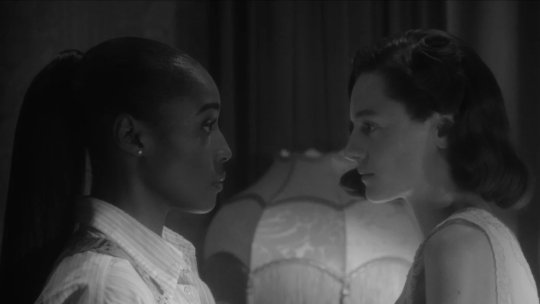
One of the most emotionally complex and narratively brilliant choices of Hotel Reverie makes is the uncertainty surrounding Clara's memory after the reset. After Brandy wakes up and hears the team calling her back to reset the scorpion scene. And this was after everything they’ve been through, the weeks they spent together in the simulation, the moments of genuine intimacy and self-discovery—Clara is returned to a point in the story before it all happened. And Clara reappears right before her very eyes, just as she was at the beginning and Clara was looking at her saying "My heart is pounding like a drum". Same intonation, Same staging. But for Brandy, it was no longer the same. For Brandy's case, since she's real human, her mind, everything was intact. The uncertainty of that scene was purely haunting and magical at the same time. What happens next is subtle. Brandy hesitates and she doesn't say her line right away. She studies Clara's face... her eyes. Searching for something.
Is it her?
Is she still in there?
Clara seems confused by Brandy's reaction but only just. Not like someone who has no memory, but like someone who feels something just beneath the surface and can't explain why. It's eerily familiar, like a love that exists without memory.
The dilemma, as someone who was now at this point fully invested with the story, I felt anxious too, constantly I was asking questions in my mind "Does she remember?" "Does she know?"
For me, I know she was reset but I think... deep inside her, she knows. A part of her remembers.
Clara’s behavior after the reset—her tone, her reluctance to meet Brandy’s eyes, the strange weight behind her words, it all hints at something deeper.
She says:
“I’m a married woman. I can’t… I shouldn’t be feeling this way.”
And it fits the script, but it also feels like a double meaning. As if she’s not just speaking as Clara the character… but as someone who remembers what happened and doesn’t know why she remembers.
There’s a moment when she looks at Brandy and her eyes shimmer—not with confusion, but with something that feels like grief. Like she knows what’s coming. Like she’s trying not to break the character, what she was asked to, what she's supposed to do as an AI.
Here’s where it gets even more tragic, and brilliant. I personally think it’s not Clara who remembers but Dorothy?
Clara is a simulation. She was a role. But she was built on the emotional DNA of Dorothy Chambers, the woman who once played her. A woman who lived a closeted life. The person who loved someone she could never be with. Who poured that heartbreak into the character of Clara.
When Brandy calls her “Dorothy,” the AI begins to shift, to change. The simulation becomes porous. Clara, for the first time, begins to feel the real woman beneath the code.
So even if Clara was reset, even if the AI has been reprogrammed—the echo of Dorothy Chamber's grief still lives inside her. And the love, once it's truly felt, is not easily erased.
So maybe... Clara doesn't remember the events, but her heart remembers something. Even if she doesn't know why Brandy suddenly feels like home.

But that's just my wishful thinking. The audience is meant to feel conflicted. It's meant to feel like we're stuck between two truths. 1. Clara is a simulation who has been reset and 2. Clara is a soul who fell in love and never truly forgot. That unresolved ache? that invisible string still pulling Brandy and Clara together even as the worlds resets is what makes the story so devastatingly human.
Because love isn't always about memories, sometimes it's about feeling something you can't explain.
And in the moment when Clara says "You must go" with eyes that know too much. Me as someone who witnessed their story unfold, realizes something terrible. That maybe Clara does remember...maybe she chooses to let Brandy go anyway. To protect her. Just like Dorothy once didn't get the chance to.
Another aspect of the story that truly haunts me was how Clara AI perceived Brandy in the beginning. In the simulation, Brandy was meant to play the role of Alex Palmer- a male, white doctor. The simulation was coded to present her to the world of the film as Alex: male, charming, heterosexual, traditionally heroic.
Brandy was in theory, masked, her body present, her identity hidden by the lens of the 1940s characters perception. But that never truly held. Not for Clara.
Despite the programming, despite the simulated environment, despite the rigid gender roles of the time, Clara sees Brandy. Not as a man, Not as Alex. Not as a character to perform with. She sees her essence, her spirit and the actor/person beneath.
As the story progresses, the romantic dynamic deepens between the two. In a story rooted in artifice, programming, gender coding and simulation, the heart cuts through all of it. Their story was shaped by presence, connection and truth. In the end, Clara doesn't say "I love you, Alex", she says, "I love you" and this was unmistakably addressed to Brandy, and she means it. And this was even after the reset.

Another thing to point out is, how much has been said about Issa Rae’s portrayal of Brandy—some calling it too subdued, too passive. But this criticism misunderstands the core of Brandy’s character.
Issa Rae plays Brandy as a woman trained to survive the industry by not feeling too much. Her detachment is not a lack of chemistry, but a shield. She enters the simulation not as a lover or a believer but as a professional, dropped into a role without context or rehearsal. She was expecting to meet fellow actors to establish connection and rapport with fellow humans. That's how acting and filming goes normally. But that isn't the case here, and because of that, she plays Alex Palmer with hesitation, with irony, with cynicism.
But slowly, that mask begins to slip.
It starts with stolen glances. Quiet awe. Little expressions of disbelief—In her mind she's probably thinking “She’s just code. Why does it feel like more?”
Rae’s restraint becomes her weapon. When the final breakdown comes when Clara is reset and no longer remembers her—Rae doesn’t explode in melodrama. She crumbles in silence. It’s not theatrical. It’s real. And it hits so much harder because of everything she held in before. She was slapped by the unfortunate and harsh truth, that everything is artificial. It's not real.
Her final delivery of “I’ll be yours forevermore”, the line she’s been waiting to say the entire film lands like a funeral vow. It's not for the camera.
It's for the woman lying dead in her arms. the one she spent endless nights, weeks, months with. The woman she fell in love with.

And then there's Emma Corrin, Emma Corrin’s performance is surgical in its softness. They play Clara with the kind of grace and vulnerability that feels too perfect at first—a fantasy of the golden age of cinema. But that’s the point. Clara is an AI. They were immaculate from the very beginning. They were playing a programmed AI designed to be seductive, poetic, elegant and timeless. Clara wasn't confused; she was supposed to follow the original movie's narrative. She was on script.
Clara isn’t supposed to feel. She isn’t supposed to change.
But as Brandy veers off script, Clara begins to show cracks. She slowly gives a smile that lingers too long. Eyes that start searching for answers to questions she was never supposed to ask. Corrin manages to convey an AI that is accidentally learning how to want.
Clara's whispered “I love you” is delivered not like a confession, but like a discovery. Like a glitch in her own programming. And the way she touches Brandy’s face, as though she’s trying to memorize something that’s already slipping away? It was not scripted; it was something sacred.
The part where she starts to grasp memories from Clara's data pool, and Dorothy's life. I was bawling. She saw fragments of her life; the applause, the movie sets, the fake smiles, the closeted love and the loneliness of being adored by millions by known by no one.
Clara felt everything and Corrin was amazing to convey such emotions in the screen. Clara saw how Dorothy was trapped in gold, wealth and fame around her like silk-lined shackles- a life where everyone wanted her, but no one ever truly saw her. And the worst part, Clara realizes she's living the same life again, inside the simulation, a role she was never meant to question. It's devastating because it says so much about how people tend to romanticize women like her; write their suffering as elegant, preserve their tragedy in HD, but never ask "What did she want?" , "Did anyone ever let her choose?"
And when Corrin delivered the line " I was born in a cage. I should die in a cage", it was so haunting and achingly beautiful at the same time because Clara was aware, and she wanted to do something Dorothy never could. Like she inherited the ending Dorothy never escaped. But she wants to end it in her own way, her own terms and not by following any script.
Corrin doesn't just play Clara. They play Dorothy, too—still trapped inside the role, finally reaching out from decades of silence, begging not to be forgotten again.
And the tragedy is—she is. and dare I say, Emma Corrin deserves at least a nomination for this role.
Hotel Reverie is not just a sci-fi romance. It is a commentary on the cost of performing for the world and the quiet revolution of being seen anyway.
Clara was never meant to feel. Brandy was never meant to care. Dorothy was never meant to be remembered for her love.
But through Brandy’s choices, through Clara’s awakening, through Issa Rae’s restraint and Emma Corrin’s vulnerability, this story became more than just a film inside a film. It became a ghost story, a love letter and a tragedy.
A reminder that even in simulated spaces, Love is always real and forgetting it is the true heartbreak.
What Hotel Reverie does without making a spectacle of it—is something profound: Despite placing its characters inside a 1940s simulation, a time riddled with racial tension, misogyny, and queer oppression, the episode refuses to make those elements the point of pain.
Brandy, a Black woman. Clara, a white woman born from a 1940s film role. Two women. Two identities that would have been considered scandalous even to be in the same room romantically during that era—
And yet? Their love is not questioned. Not framed as political. Not punished for its optics.
There is no scene where Brandy’s race is mocked or tokenized. There’s no line of dialogue explaining why Clara’s AI programming “accepts” her. There is no moment where the gender of their relationship is pointed out as deviant.
It just exists.
And that is so, so rare. In a world of stories that center conflict around identity—in which being queer or being a person of color is the obstacle to overcome—Hotel Reverie offers something revolutionary because it lets love be the center. It's not about the struggle, the scandal, the justifications.
Brandy's identity is present and it's the core of her whole personality, but it does not define her worthiness to be loved. Clara's identity too, is not a reflection of purity or acceptability. She is not the symbol of 'ideal femininity." She is a construct who becomes real. 'It's not a queer love in a time that forbids it" it's just two souls who were never meant to meet but finding each other anyway. Because when the world falls away, when time, rules, programming and expectations crumble,
Love is just love.
It doesn't need to be explained.

164 notes
·
View notes
Text
Fangs of Fortune (Bai Ze Ling): perfect on pure aesthetics alone, but also it will tear your heart out while being very gay.

I was lured in to this show by Tumblr gifsets and friends on Bluesky talking about how queer and poly this show is. I'm old and I've been in fandom more than half my life. I know how to read queer subtext. I'm also pretty well versed in cdramas, so again, I know how to read subtext. So I went into this ready to, well, read the subtext.
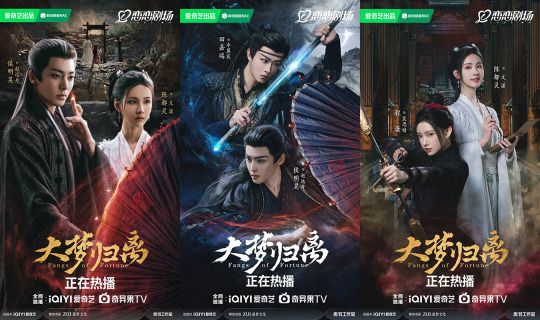
But no this show is just puts the queer it right there in the text. The vague information we have about Chinese censorship repeatedly left me asking, 'wait how are they getting away with this?' Like some of these jokes and implications are just so blatant it seems incredible this show ever made it to being broadcast. It just feels very much like queer media made for queer people even if t's more subtle than something western like Queer as Folk.
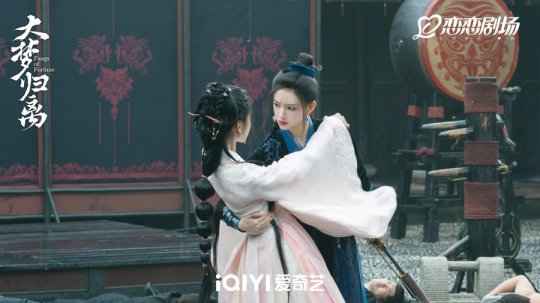
Even without the heavy coloring of gay this show is incredible and so much more than I expected from the title and the promo. The premise is essentially the death of the goddess, who governed relations between humans and demons, leads to an influx of demons in the human world. This brings together the goddess's disciple, Wen Xiao--seeking to restore the goddess's power. WX's childhood sweetheart, Zhuo Yichen--seeking to restore the demon-hunting bureau after the powerful demon Zhu Yan killed his father and brother. It opens on Zhu Yan, in human disguise as as Zhao Yuanzhou, volunteering to help the imperial court restore the demon-hunting bureau to quell the chaos. They are joined by Pei Sijing, a retired female general from the rival demon hunting sect, and a very young doctor (and comic relief) named Bai Jiu. It starts off as a sort of monster-of-the-week with a grim Scooby gang doing detective work and fighting monsters. Each major demon has a mini arc that relates to the larger case (restoring the power of the goddess to balance the realms), and they are repeatedly blocked by either the demons or the rival demon hunting sect. Each mini arc also acts as a mirror or parallel story to slowly revealed backstory of all the main characters as well. In true cdrama fashion it's a mix of adventure, intense emotional drama, romance, and comedy. And queer and poly jokes and romance. It also has a kind of manga vibe in the way the comedy is woven into the more serious story, and in the fantastical depiction of the characters and how the story unfolds.
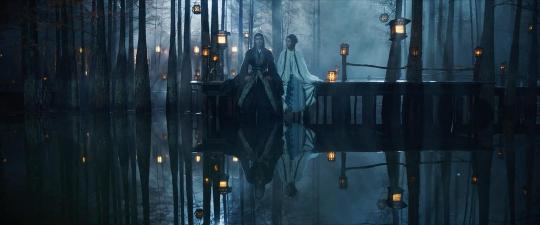
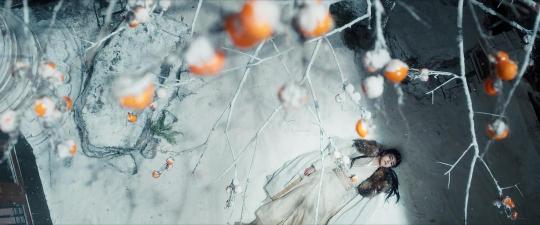
It is also just insanely beautiful. Every single shot is lovely. The costumes, make up, and hair are incredible. The casting director made all the major demons inhumanly beautiful. The sets are spectacular. The effects are nicely done. Every bit of has the vague surreality of a fairytale. The perfection of each shot ads to the manga vibe, as if we're seeing each critical storytelling panel come alive. There's recurring water-based special effects that are just gorgeous. Based on aesthetics alone this show would be worth watching to me. That it is combined with a complex, very emotional story is a spectacular gift to the watcher. A lot of the negative reviews of this complain about the staginess or that it's overly contrived in how each scene is shot. But I think it's gorgeous, works perfectly with the storytelling, and if we criticize art on whether it achieves the goal it intended then this show is doing exactly and perfectly what it means to do and doing it beautifully.
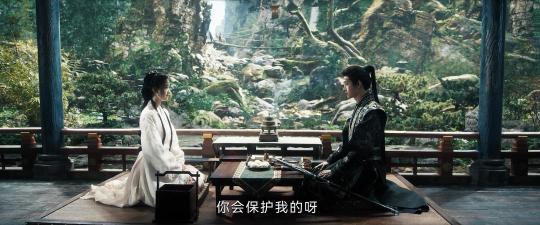

Additionally the acting is also very good, but Neo Hou is the stand out for sure. I enjoyed him in Back from the Brink, especially the later part of the story, but in Fangs of Fortune he's transformed, utterly embodying the role, the way Dylan Wang is Dongfang Qingcang in Love Between Fairy and Devil. Neo Hou has the right look, a slightly uncanny beauty perfect for a gorgeous immortal not of this world. The show does incredible things with his styling between the various looks and personas the role requires. But in acting he somehow manages to utterly transform his face and demeanor to manifest each aspect of the character as story demands changes from him.
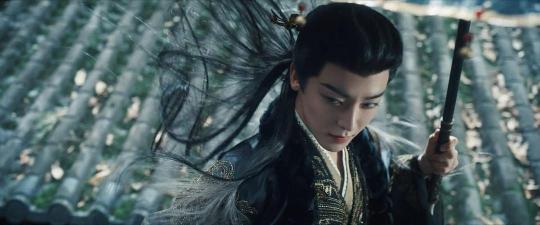
There is a lot of crying in this drama. Like early on I joked that there was going to be a character crying a single perfect tear in every ep. Lol nope. Multiple single perfect tears per ep and many outright full on sobbing scenes. This show is just waiting to rip your heart out and you see it right from the beginning. But it was such sweet pain all the way through. Just a truly engaging and utterly wrenching set of intertwined stories.
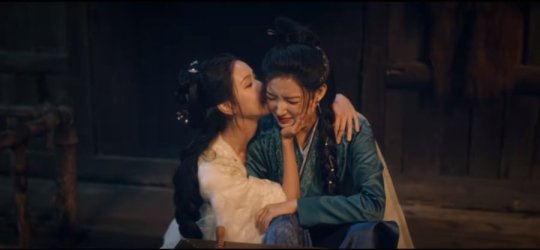
My only criticism is that the pacing falls apart in the last 3 episodes. But overall the story is solid through the end, though like so many cdramas, it's saved by the epilogue.
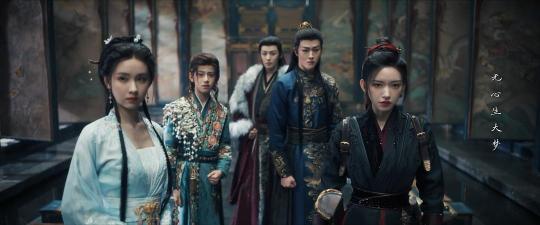
You should absolutely watch it if you want the chaotic bi polycule (it's her, her girlfriend, her boyfriend, her boyfriend's boyfriend who is also her boyfriend, their two idiot sons, and her boyfriend's ex-who is also eventually sort of his boyfriend again), or if you want your heart torn out and stomped on. Or even if you just like really gorgeous cinematic things. Also if you watch, please don't skip the ending credits, as they change as the arcs change, and the radiant joy Tian Jiarui has as he dances is an excellent antidote to the emotions of each episode.
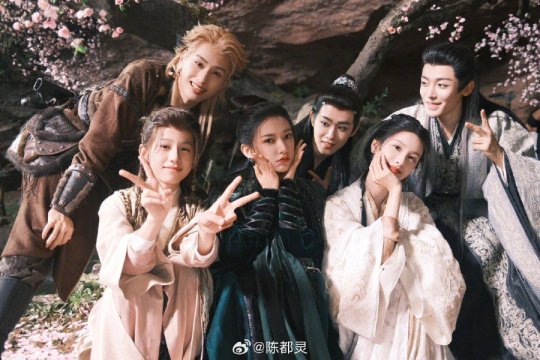
#Fangs of Fortune#大梦归离#Bai Ze Ling#cdrama#Hou Minghao#Neo Hou#侯明昊#Zhao Yuanzhou#Chen Duling#Wen Xiao#Tian Jia Rui#Zhuo Yichen#Cheng Xiao#Pei Sijing#Lin Ziye#Bai Jiu#Yan An#Li Lun#ab-HMH-mine#ab-reviews#it's really the xianxia polycule of dreams#which I didn't know to hope for until this show spoonfed it to me
333 notes
·
View notes
Text
So it is with Florence Hines, a Black singer and drag king who got her start on the stage sometime around 1891, when she began to receive particular notice for her performances with Sam T. Jack’s Creole Burlesque. When the show came to Paterson, NJ, on November 23, 1891, “hundreds were turned away from the doorway” before the Creole Burlesque was even scheduled to take the stage, according to the Paterson Daily Caller. In their review, they called out Hines in particular for being an “excellent male impersonator.” The Creole Burlesque was a standard minstrel show, featuring all Black performers, led by a white manager, giving skits, songs, and scenes that featured standard variety acts (everything from clog dancing to drag) set in a pre-Civil War Southern plantation fantasy. But within a few years, Sam T. Jack would launch The Creole Show, an important milestone in Black performance in America. For the first time, an all-Black revue was presented as a modern, staged performance — not as an “authentic” recreation of Black life. According to Whiting Up, a history of white face entertainment by Black theater historian Marvin McAllister, The Creole Show was “a major outlet for Black artists interested in… developing a comedic tradition that was racially grounded but not riddled with stereotyping.” In another important departure from tradition, instead of hiring a man to play the traditional lead role of interlocutor or master of ceremonies, Sam T. Jack hired Florence Hines. As a drag king, Hines performed a routine that made mock of the “dandy” — flashy, modern, young men who drank and dated openly, and wore the latest clothes. One of her most famous numbers was “Hi Waiter! A Dozen More Bottles,” whose first verse went: Lovely woman was made to be loved, To be fondled and courted and kissed; And the fellows who’ve never made love to a girl, Well they don’t know what fun they have missed. I’m a fellow, who’s up on the times, Just the boy for a lark or a spree There’s a chap that’s dead stuck on women and wine, You can bet your old boots that it’s me. Many white drag kings of the day also performed this song, and similar dandy characters. For these performers, the dandy was a way to needle the men in the audience. But for Black performers, taking on a dandy role was also a way of resisting degraded depictions of Black people that were common on stage at the time. As Kathleen B. Casey wrote in The Prettiest Girl on the Stage is a Man, “when worn by a Black performer, the tuxedo with tails, cane, cape and a top hat countered the image of the ragged, shoeless plantation slave.” Thus, Hines made a natural choice for a show that wanted to show an entirely new kind of Black performance. By 1904, The Indianapolis Freeman would report that Hines “commanded the largest salary paid to a colored female performer.” In their book, Out of Sight: The Rise of African American Popular Music, 1889-1895, Lynn Abott and Doug Seroff wrote that “Hines’s male impersonations provided the standard against which African American comediennes were compared for decades.”
347 notes
·
View notes